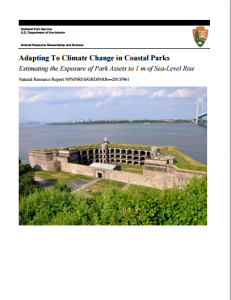Full Title: Adapting to Climate Change in Coastal Parks
Author(s): Katie McDowell Peek, Robert S. Young, Rebecca L. Beavers, Cat Hawkins Hoffman, Brian T. Diethorn, and Shawn Norton
Publisher(s): U.S. Department of Interior National Park Service
Publication Date: June 1, 2015
Full Text: Download Resource
Description (excerpt):
Over the next century, warming global temperatures will present many challenges for the National Park Service (NPS) and public land managers. Rising sea level will be one of the most obvious and most challenging impacts of this warming. Even a minor increase in sea level will have significant effects on coastal hazards, natural resources and assets within national parks. To begin addressing these issues, the Program for the Study of Developed Shorelines (PSDS) at Western Carolina University (WCU) has partnered with NPS to begin an assessment of the level of exposure that park owned assets will face during a period of rising sea level.
The first phase of this collaborative project between WCU and NPS has focused on identifying NPS assets that may be threatened by a future 1 m rise in sea level within 40 coastal units. A 1 m rise in sea level can be expected to occur in the next 100 to 150 years. Many of the assets identified are already vulnerable to existing coastal hazards (erosion and storms).
This project utilized an existing database (Facilities Management Software System; FMSS) containing a comprehensive list of assets within each unit. The primary objective of this analysis was to locate each asset geospatially and identify its approximate elevation. Although this seems relatively straightforward, there are over 10,000 assets within these 40 coastal units. Therefore, a variety of methods has been used to complete the work, including the acquisition of numerous
existing datasets, collaboration with park staff and field visits to locate assets.
